Related Research Articles

The Aboriginal and Torres Strait Islander Commission (ATSIC) (1990–2005) was the Australian Government body through which Aboriginal Australians and Torres Strait Islanders were formally involved in the processes of government affecting their lives, established under the Hawke government in 1990. A number of Indigenous programs and organisations fell under the overall umbrella of ATSIC.
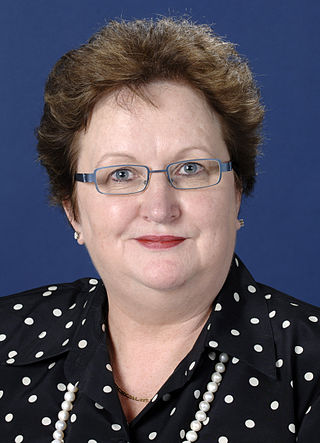
Amanda Eloise Vanstone is an Australian former politician and a former Ambassador to Italy. She was a Liberal Senator for South Australia from 1984 to 2007, and held several ministerial portfolios in the Howard Government. After her resignation from the Senate in 2007, she served as the Australian Ambassador to Italy until July 2010. Her time as Minister for Immigration was marked by controversies within the Department of Immigration and Multicultural and Indigenous Affairs.

Lowitja Lois O'Donoghue Smart, is an Aboriginal Australian retired public administrator. In 1990-1996 she was the inaugural chairperson of the Aboriginal and Torres Strait Islander Commission (ATSIC). She is patron of the Lowitja Institute, a research institute for Aboriginal & Torres Strait Islander health and wellbeing.
The Office of Indigenous Policy Coordination (OIPC) was the Australian Government-led unit for the coordination of policy, programs and services for Indigenous Australians from July 2004 to August 2011.
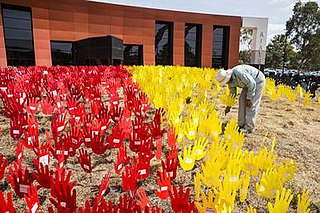
The Australian Institute of Aboriginal and Torres Strait Islander Studies (AIATSIS), established as the Australian Institute of Aboriginal Studies (AIAS) in 1964, is an independent Australian Government statutory authority. It is a collecting, publishing and research institute and is considered to be Australia's premier resource for information about the cultures and societies of Aboriginal and Torres Strait Islander peoples. The institute is a leader in ethical research and the handling of culturally sensitive material and holds in its collections many unique and irreplaceable items of cultural, historical and spiritual significance. The collection at AIATSIS has been built through over 50 years of research and engagement with Aboriginal and Torres Strait Islander communities and is now a source of language and culture revitalisation, native title research and family and community history. AIATSIS is located on Acton Peninsula in Canberra, Australian Capital Territory.
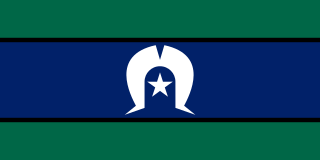
The Torres Strait Islander Flag is an official flag of Australia, and is the flag that represents Torres Strait Islander people. It was designed in 1992 by Bernard Namok. It won a local competition held by the Islands Coordinating Council, and was recognised by the Aboriginal and Torres Strait Islander Commission in June 1992.
The Office of Aboriginal and Torres Strait Islander Health, often known by its acronym OATSIH, was a division of the Australian Government's Department of Health and Ageing. It was set up in 1994 in the then Department of Human Services and Health to give a greater focus on the health needs of Indigenous Australians in mainstream health programs.
The Department of Families, Community Services and Indigenous Affairs was an Australian government department that existed between January 2006 and December 2007. The department which preceded the Department of Families, Community Services and Indigenous Affairs was the Department of Family and Community Services (1998–2006).
Indigenous Australian self-determination, also known as Aboriginal Australian self-determination, is the power relating to self-governance by Aboriginal and Torres Strait Islander peoples in Australia. It is the right of Aboriginal and Torres Strait Islander peoples to determine their own political status and pursue their own economic, social and cultural interests. Self-determination asserts that Aboriginal and Torres Strait Islander peoples should direct and implement Aboriginal and Torres Strait Islander policy formulation and provision of services. Self-determination encompasses both Aboriginal land rights and self-governance, and may also be supported by a treaty between a government and an Indigenous group in Australia.
Sue Gordon is an Aboriginal retired magistrate from Western Australia who has been locally and nationally honoured for her work with Aboriginal people and in community affairs. She is known for being chair of the Gordon Inquiry in 2002.
Mimili is an Aboriginal community in the Anangu Pitjantjatjara Yankunytjatjara Lands in South Australia, comprising one of the six main communities on "The Lands". At the 2016 Australian census, Mimili had a population of 243.
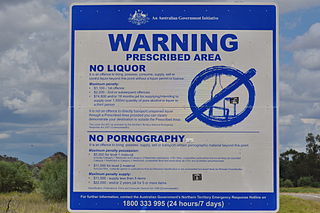
The Northern Territory National Emergency Response, also known as "The Intervention" or the Northern Territory Intervention, and sometimes the abbreviation "NTER" was a package of measures enforced by legislation affecting Indigenous Australians in the Northern Territory (NT) of Australia, which lasted from 2007 until 2012. The measures included restrictions on the consumption of alcohol and pornography, changes to welfare payments, and changes to the delivery and management of education, employment and health services in the Territory.
Wilfred James "Bill" Gray is a former senior Australian public servant, and specialist in Aboriginal affairs.
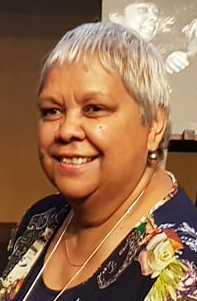
Jacqueline Gail "Jackie" Huggins is an Aboriginal Australian author, historian, academic and advocate for the rights of Indigenous Australians. She is a Bidjara/Pitjara, Birri Gubba and Juru woman from Queensland.
The Indigenous Land and Sea Corporation (ILSC) is an Australian federal government statutory authority with national responsibilities to assist Aboriginal and Torres Strait Islander people to acquire land and to manage assets to achieve cultural, social, environmental and economic benefits for Indigenous peoples and future generations. It was established as the Indigenous Land Corporation (ILC) following the enactment of the Native Title Act 1993.

Mick Gooda is an Aboriginal Australian public servant including serving as Aboriginal and Torres Strait Islander Social Justice Commissioner of the Australian Human Rights Commission from 2009 to 2016 and Co-Commissioner of the Royal Commission into the Protection and Detention of Children in the Northern Territory from 2016 to 2017. He is a descendant of the Gangulu people of Central Queensland.
The Indigenous Voice to Parliament is the proposed new advisory group containing separately elected Aboriginal and Torres Strait Islander people, perpetually enshrined in the Constitution of Australia, which would "have a responsibility and right to advise the Australian Parliament and Government on national matters of significance to Aboriginal and Torres Strait Islander peoples".
Reconciliation in Australia is a process which officially began in 1991, focused on the improvement of race relations between the Aboriginal and Torres Strait Islander peoples of Australia and the rest of the population. The Council for Aboriginal Reconciliation (CAR), created by the government for a term of ten years, laid the foundations for the process, and created the peak body for implementation of reconciliation as a government policy, Reconciliation Australia, in 2001.
Constitutional recognition of Indigenous Australians has been campaigned for since 1910, including having an Indigenous voice to parliament enshrined in the Constitution of Australia.
The Indigenous Advisory Council (IAC), also known as the Prime Minister's Indigenous Advisory Council, was established by then Prime Minister of Australia, Tony Abbott. The council was created on 25 September 2013, announced on 23 November 2013 and its inaugural meeting was on 5 December 2013.
References
- 1 2 Parliament of Australia. Select Committee on the Administration of Indigenous Affairs (March 2005). "Chapter 4: Representation". After ATSIC: Life in the mainstream?. Commonwealth of Australia. ISBN 0-642-71501-7.
- 1 2 3 Tarczynski, Stephen de (16 March 2008). "RIGHTS-AUSTRALIA: Concerns Over New Indigenous People's Body". Inter Press Service. Retrieved 5 February 2021.
- ↑ Rowse, Tim (14 October 2020). "How John Howard Positioned Himself as Indigenous Australia's Champion". ANU Historical Journal II . 2 (2): 169–194. doi: 10.22459/ANUHJII.2020.09 . S2CID 241897048.
- ↑ Calma, Tom (4 June 2008). "Sustainable options for Australia's new national Indigenous representative body". Australian Human Rights Commission . Speech from a Native Title conference.
- 1 2 Vanstone, Amanda. "National Indigenous Council appointed". The Hon Mal Brough MP. Archived from the original on 9 October 2007.
- ↑ "National Indigenous Council". The Hon Mal Brough MP. Archived from the original on 30 October 2007.
- 1 2 "Australian Government Announcement of new Indigenous Council Sparks Debate". Cultural Survival. 2004. Retrieved 5 February 2021.